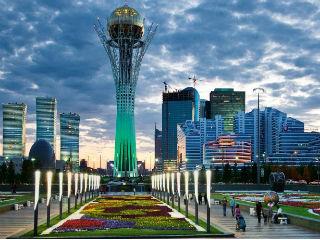There is no such thing as a perfect country or perfect political leadership: they all have their faults. So, it's important to focus on qualities, vision and the ambition to carry that vision forward despite setbacks of all kinds

Kazahstan has a great chance to shine globally in 2017 by its Expo on Future Energy, the Winter Universiade and other initiatives. As mentioned in the ”100 concrete steps”, the infrastructure build in the context of Astana 2017 will lay the ground for a larger build-up: Astana International Financial Center. For all these ambitious plans to succeed, Kazakh leaders need to build a multicultural alliance of passionate nationals and enthusiastic foreign friends who want to see Kazahstan succeed in all traits of international leadership: in terms of will, values, vision, success anchored in 21st century’s needs. Kazahstan no longer needs the Singapore model, it is shaping its own.
by
Radu Magdin*
Cruising around the globe one can see cases of rapid and extraordinary development: Singapore comes to mind, but so does Kazahstan, a way bigger landlocked Asian state. Interestingly, there is a connection: long acclaimed father of Singapore's nation, Lee Kuan Yew, met and inspired another future father of the nation, Nursultan Nazarbayev, in Kazahstan's early transition days. A recipe based on social stability and economic development as priorities was valid for both countries for more than two decades.
Kazahstan is clearly a very ambitious country, one of the most ambitious by 21st century standards. If one browses beyond major political speeches and constitutional reform (the case in January 2017), one can find a very ambitious, reform driven, agenda for development. Whether talking about the "Manifesto: The World. The 21st century", the "100 concrete steps on the five institutional reforms" or "Kazashstan 2050 Strategy", there is monumental work to be done. This requires discipline, public policy efficiency doubled by private sector effectiveness, as well as a massive work of communications both at home and abroad.
This is needed because of steep international competition, as well as the need to match human capital with the leadership's ambitions: clearly there is a need of both improved local capacities as well as foreign minds, a pool of combined human resources. If Astana wants to succeed as an expat hub, it should adapt and learn from other major cities such as London; Brexit is an opportunity from this perspective, including in terms of attracting or boosting a vibrant international community in town.
It was not easy to be Singapore, and it's not easy to be Kazahstan, including in terms of geopolitics. Beijing was looking closely for decades at the city state, Moscow is still paying close attention to Astana. By a multivector foreign policy, the Kazahs managed to create the appearance of making everyone happy, by being serious partners to a variety of international interests. Such international interests were happy to see Kazahstan rise but may not be there as allies all the way, particularly if they sense strong regional competition.
For example, President Nazarbayev, and his eventual successors, when carrying out their ideas, may find that not everyone wants a good governance model in Central Asia (what if it becomes "contagious" in the former USSR space?), not everyone may welcome the expansion of kazakh "national business champions". Competing interests would not like to see Astana turn into Euroasia's preferred business centre or Almaty become an international aviations hub. In addition, the global 2017 fight for whoever is or looks first (Trump's America is, at least, under such a Presidential mantra) may make a whole array of global actors more nervous.
Kazahstan has a great chance to shine globally in 2017 by its Expo on Future Energy, the Winter Universiade and other initiatives. As mentioned in the "100 concrete steps", the infrastructure build in the context of Astana 2017 will lay the ground for a larger build-up: Astana International Financial Center. For all these ambitious plans to succeed, Kazakh leaders need to build a multicultural alliance of passionate nationals and enthusiastic foreign friends who want to see Kazahstan succeed in all traits of international leadership: in terms of will, values, vision, success anchored in 21st century's needs. Kazahstan no longer needs the Singapore model, it is shaping its own.
*Radu Magdin is a Romanian analyst and consultant, former advisor to the Romanian Prime Minister on external communications




 By: N. Peter Kramer
By: N. Peter Kramer

